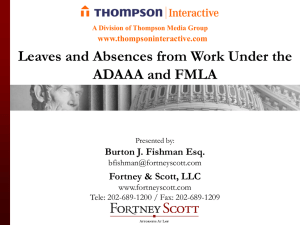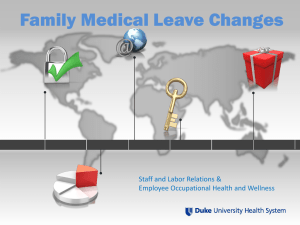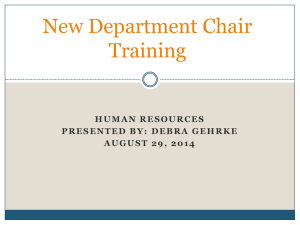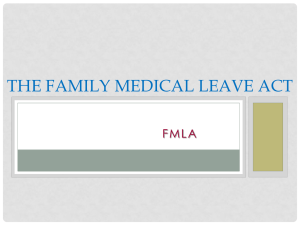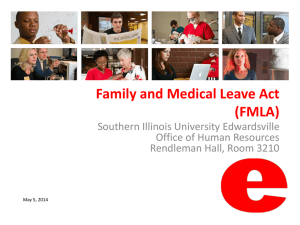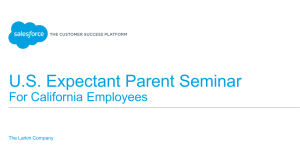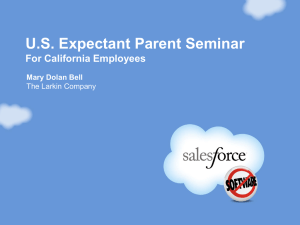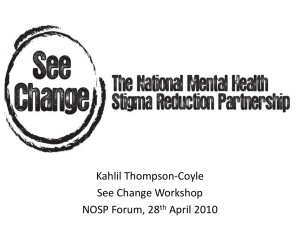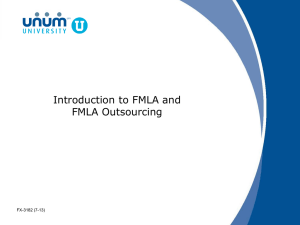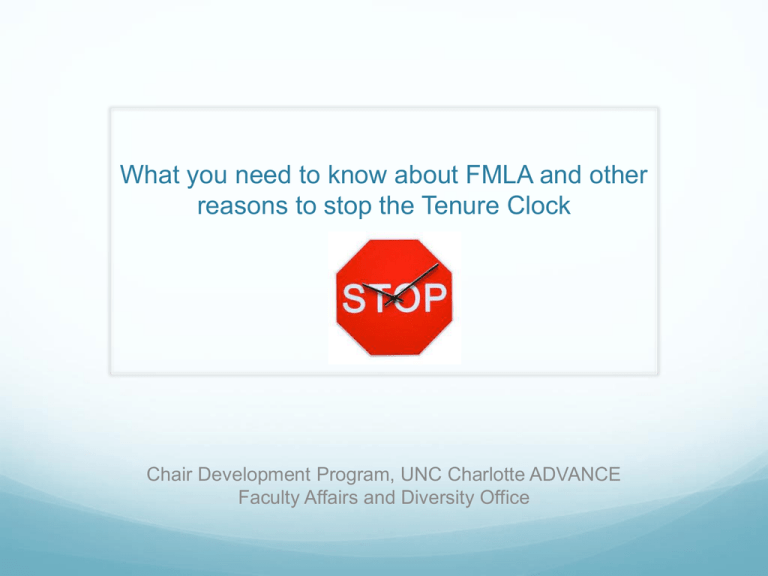
What you need to know about FMLA and other
reasons to stop the Tenure Clock
Chair Development Program, UNC Charlotte ADVANCE
Faculty Affairs and Diversity Office
The Nuts and Bolts of FMLA
Purpose of FMLA
•
To balance the demands of the workplace with the needs of families, to
promote the stability and economic security of families, and to promote
national interests in preserving family integrity
•
To minimize the potential for employment discrimination on the basis of
sex by ensuring generally that leave is available for eligible medical
reasons (including maternity-related disability) and for compelling family
reasons
•
To promote the goal of equal employment opportunity for women and
men.
Qualifying Reasons for FMLA
Family and Medical Leave (FMLA) provides up to 12 (or 26, as appropriate) workweeks of unpaid, job-protected
leave in a 12-month period for one or more of the following qualifying reasons:
Birth and care for a newborn;
Care for an adopted or foster child;
Care for a child, spouse, or parent with a serious health condition;
A personal serious health condition* that prevents the employee from performing one or more of the essential
functions of the position;
Any qualifying exigency* arising out of the fact that the spouse, or a son, daughter, or parent is a military
member on covered active duty (or has been notified of an impending call or order to active duty) in support of
a contingency operation; and,
An eligible employee who is the spouse, son, daughter, parent, or next of kin of a covered service member shall
be entitled to a total of 26 work weeks of leave during a single 12-month period (commencing on the on the
date the employee first takes leave) to care for a covered service member who has a serious injury or illness
incurred in the line of duty on active duty for which he or she is undergoing medical treatment, recuperation or
therapy; or otherwise in outpatient status; or on the temporary disability retired list.
* check out: http://www.oshr.nc.gov/Guide/Policies/5_Leave/Family%20and%20Medical%20Leave.pdf
Who is Eligible?
Full-time (Permanent, probationary, trainee, or time-limited), has at least 12
months total service with the State, and has been in a pay status at least 1040
hours in the previous 12 months.
Part-time (half-time or more permanent, probationary, trainee, or time-limited) and
has been in pay status at least 1040 hours during the previous 12-months.
Temporary, intermittent, or part-time (less than half-time) and has been in pay
status at least 1250 hours during the previous 12 months.
FMLA for 9 Month Faculty (Policy 102.6)
Eligibility:
This Policy applies to faculty with academic year appointments who:
(a) do not accrue sick leave
(b) are eligible for membership in the Teachers’ and State Employees’ Retirement
System of North Carolina or the State’s Optional Retirement Program.
The Policy does not apply to faculty with fiscal year (11- or 12-month)
appointments, because they are eligible for and accrue sick and vacation leave that
can be used for FMLA leave.
FMLA for 9 Month Faculty (Policy 102.6)
Purpose:
Full-time 9-month faculty members are provided paid leave (Continuation Pay) for a period
of up to one semester for eligible faculty. This benefit is provided to reduce disruption in the
classroom.
Intermittent FMLA can be taken, where an employee works a reduced or intermittent work
schedule because of his or her own serious health condition or to care for the employee's
spouse, child, parent or service member who has a serious health condition.
Short-term leaves of less than six weeks during a semester should be handled at the
department and/or college levels by scheduling existing faculty to provide coverage for an
absent colleague.
FMLA and Stopping the Tenure Clock
When a non-tenured, tenure track faculty member is granted Continuation Pay, an
automatic one-year extension of the tenure clock will be granted.
The tenure clock extension will be discussed and verified in the Provost’s approval
letter.
A maximum of two (2) automatic one-year extensions of the tenure clock will be
granted to an individual under this Policy.
A faculty member may opt out of the automatic one-year extension to the
tenure clock by giving written notice of the opt out decision to the Provost, Dean
and Department Chair.
Administration of Leave
A faculty member must apply for FMLA leave/Continuation Pay through Human
Resources to ascertain if he/she qualifies.
Upon receipt of preliminary approval from Human Resources, the faculty member
should complete the Academic Affairs form AA-32 and obtain all the necessary
departmental and college approvals. The Provost’s office will provide written
notification with final approval of the faculty member’s request.
Sounds Simple, but….
MANY FACULTY DO NOT REALIZE
THEY ARE ELIGIBLE FOR, OR WORRY
ABOUT THE REPERCUSSIONS OF
REQUESTING FMLA
Consequences of Flexibility Stigma Among Academic
Scientists and Engineers. Erin A. Cech, Mary Blair-Loy
Flexibility stigma: a term scholars use to describe work places that punish
those who don’t fit the “ideal worker” profile: solely devoted to one’s job,
available 24 hours a day and traditionally male.
Previous studies suggest such biases are particularly prevalent in the
sciences, and that women with young children are the most frequent
targets.
This study reveals that both men and women with small children report
and resent inflexible department cultures, and that even non-parents
resent flexibility stigma, with negative consequences for the department
over all
Full article: http://wox.sagepub.com/content/41/1/86.full.pdf+html
The Study…….
266 STEM faculty members at an unnamed top research institution with
"preeminent" science and engineering programs responded to an online
questionnaire about family status, gender and perceived levels of flexibility
stigma in their departments.
They were also asked to rate, from 1 to 5, whether or not they would
consider leaving academe for careers in industry, their job satisfaction,
and achieved work-life balance.
The Results……
Faculty members’ belief that making use of work-life policies, such as
taking an occasional sick day to care for an ill child, leads to negative
consequences in their departments is strongly related to their beliefs that
mothers and fathers are seen in their departments as less committed.
Women are more likely than men to report flexibility stigma, and parents
with children under age 3 are likelier to report stigma than their non-parent
colleagues.
Surprisingly, mothers and fathers are equally likely to report flexibility
stigma.
Although 75 percent of the respondents were parents, just 14
percent have taken advantage of work-life policies
Consequences of Perceived Flexibility Stigma
Respondents who report flexibility stigma are significantly more likely to
want to leave academe for industry; less likely to want to remain at the
university long-term; feel less work-life balance; and are less satisfied with
their work over all.
Analysis controlled for demographics, career and family status- translates
into even non-parents feel the sting of flexibility stigma.
In addition to fuelling low morale, flexibility bias can have significant
financial repercussions for employers given the costly start-up packages
associated with hiring new science and engineering faculty.
What should chairs do?
What Chairs should be doing
Chairs need to understand FMLA policy so they can advise their faculty on this
issue.
Chairs need to be proactive about discussions with their faculty around FMLA –
many faculty are completely unaware that they qualify for FMLA, or have serious
misconceptions about the process.
Set up a meeting with a faculty member who is (or soon will be) experiencing a life
event that qualifies them for FMLA.
Explain the process and the benefits to the faculty member (extension of tenure
clock etc.).
Other Fun Facts about FMLA
Coordination of FMLA with Other Policies
Continuation Pay authorized under FMLA does not impact or reduce a faculty
member’s employer paid benefits, such as retirement or health insurance.
Money’s are provided by AA to cover costs of teaching for the faculty on FMLA
If it is anticipated that an illness or disability will require an extended absence from
faculty duties for a period longer than one semester, the HR Benefits Office can
provide information on the Disability Income Plan of North Carolina (DIPNC) and
other applicable voluntary supplemental disability programs.
The North Carolina Family Illness Act allows for an extension of up to 52 weeks of
leave without pay during a five-year period in cases of serious illness of a child,
spouse, or parent.
Restrictions to FMLA Policy for Nine - Month Faculty
An eligible faculty member must work for the University for one full academic year before
becoming eligible for Continuation Pay under this Policy.
After an eligible faculty member receives Continuation Pay for a semester, he/she must
work another full academic year before becoming eligible to request and receive another
semester of Continuation Pay.
A faculty member who resigns, is separated, retires or is otherwise terminated or
discharged by the University during a scheduled leave period may not receive
Continuation Pay beyond the date of such resignation, separation, retirement,
termination or discharge.
Continuation Pay under this Policy is not available during the period from May 16
through August 14.
If a faculty member has a qualifying condition after having exhausted his/her
Continuation Pay benefit, the faculty member may be eligible for disability benefits and
should contact the HR Benefits Office for guidance.
Personal (Non-FMLA) Leaves of Absence for Nine-Month
Faculty
Personal (Non-FMLA) Leaves of Absence for Nine-Month Faculty
University Policy 102.15
If a faculty member does not qualify for FMLA leave or has exhausted the FMLA
benefit, a personal leave of absence may be requested for no less than one
semester and no more than one academic year.
All requests for personal leave of absence must be initiated at least three months
in advance of the beginning of the requested leave by submitting form AA-32,
Request for Leave of Absence for a Member of the Faculty in 9-month
Appointment, to the faculty member’s immediate supervisor.
The supervisor shall review the request for leave, and if approved, the supervisor
shall submit the request to the department chair for review.
If the supervisor is the department chair, such request shall be forwarded to the
dean of the college.
The department chair shall then review the request for leave, and if approved, the
department chair shall submit it to the dean of the college for review.
Personal (Non-FMLA) Leaves of Absence for Nine-Month Faculty
University Policy 102.15 (continued)
If the department chair or dean of the college denies the request, the
faculty member may appeal to the Provost.
Personal leaves of absence are without pay, and during a personal leave
without pay, the University will cease payment of all employment
benefits. The faculty member on personal leave will be responsible for
the full cost of his or her health insurance benefit, and all contributions to
the retirement system will cease during this period of time.
Approval of personal leave does not automatically extend the period
of review for reappointment, tenure, or promotion. A request for
extension of the period of review for reappointment, tenure, or promotion
should be made as part of the request for personal leave of absence.
Other Legitimate Reasons to Stop the Tenure Clock
Other Legitimate Reasons to Stop the Tenure Clock
Physical-plant problems that retard the ability of the faculty to perform their work
(tardy lab renovations, leaky roofs, moves within campus)
Catastrophic event in lab, e.g. losing critical samples because of freezer outage
Delay in getting lab up and running because of delay in obtaining vital equipment
Military Service and the Tenure Clock
In advance of leaving work to perform military duty, a faculty member
may initiate a request, consistent with University policy, for an extension
of the time during which an institutional decision must be made regarding
reappointment, tenure, or promotion.
Remember……
HAPPY FACULTY ARE PRODUCTIVE FACULTY


